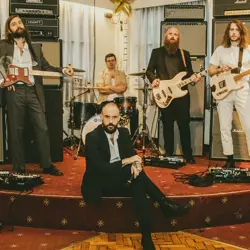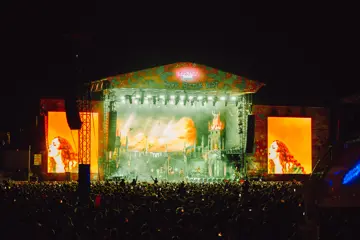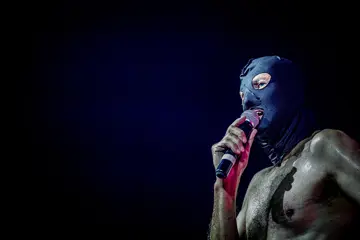 IDLES
IDLESThis article contains discussion of sexual assault. If you or someone you know is impacted by sexual assault, domestic or family violence, call 1800RESPECT on 1800 737 732 or visit 1800RESPECT.org.au.
In 2007, Spin Magazine dubbed 1977 “the year punk exploded”, demonstrated on their front cover with a very meta image of Sex Pistols' frontman Johnny Rotten squeezing at his face. A formative year for the scene and the worldwide communities that followed, 1977 saw the release of albums like Never Mind Bollocks, Here’s The Sex Pistols, Blondie’s Plastic Letters, Ramones’ Rocket To Russia and Leave Home, and the rise of bands like Siouxsie & The Banshees, The Slits, The Clash and X-Ray Spex. Closer to home, it was acts like The Saints and Radio Birdman informing the Australian wave.
The US offered some of the ‘80s most influential acts, with groups like Black Flag, Fugazi, Bad Religion and X. Given the arid conditions for female-led punk groups during the decade, it’s unsurprising that the 1990s gave way to the Riot Grrrl movement, led by acts like Bikini Kill, Bratmobile, Huggy Bear and Sleater-Kinney. The late ‘90s and early 2000s led to a surge of pop-punk, while the influence of SoCal punk reached around the globe. Florida punk saw a peak in the mid-‘00s with bands like Against Me! and Fake Problems, while the late ‘00s and early ‘10s gave way to a more emo-focused trend.
2018 offered a potentially evolutionary year for punk. #MeToo’s effect is showing and has the potential to influence a new generation of Riot Grrrls, perhaps creating an even more inclusive scene than its first ideation. Emo might not be a trend that many may wish to subscribe to, or even admit that they liked in the first place, but it has had its influence - is it possible that its heightened lyrical vulnerability could be the new, and staying, trend in punk for 2019 and onwards?
Don't miss a beat with our FREE daily newsletter
IDLES won’t call themselves a punk band; in fact they even detest the inference of it. But listening to the five-piece from Bristol in the UK, it can feel hard to find another sonic home for them. With their brash and fast-paced sound, it would be easy to miss the thing that makes IDLES special - a stark, honest and, at times, brutal lyricism that challenges societal norms and toxic behaviours.
Danny Nedelko, perhaps the breakout track for the band from their 2018 album Joy As An Act Of Resistance, tackles immigration and racism. June speaks tenderly of frontman Joe Talbot’s stillborn daughter. There’s references to Margaret Atwood in Mother from their 2017 debut album, Brutalism, the song bridging with the lines: “Sexual violence doesn’t start and end with rape/It starts in our books and behind our school gates/Men are scared women will laugh in their face/Whereas women are scared it’s their lives men will take.”
“Best band in the world right now, by a country mile,” declared one fan on the band’s Facebook page. “Most important album for a whole generation.” It’s a broad call, but considering the current state of post-Brexit vote UK, maybe Joy As An Act Of Resistance does have the potential to be at least a defining album for this generation and a reference point for the next.
Closer to home, this year's BIGSOUND summit offered some of the local scene's best up-and-comers. Tasmanian group A Swayze & The Ghosts had The Foundry full and heaving, with frontman Andrew Swayze walking through the crowd, bashing a tambourine one moment and addressing the country's political state the next. They continued to pack out rooms for the rest of the week.
Brisbane four-piece VOIID quickly became the talk of the town following their set at The Zoo. Only three years into their tenure as a band, the group have quickly made a name for themselves with their live act and blistering tracks like Silly Girl and Twin, self-described as “a four-piece of hellish girl-shriek guaranteed to make your face melt and your boyfriend cry”.
“The scene is definitely getting better but there is still room for improvement,” says drummer Jasmine Cannon when asked if the punk community is an inclusive one in 2018.
“It depends where you look, but that goes for pretty much any and every genre of music and the scene that comes with it. 2018 has definitely been heavy with calling out problematic acts and problematic supporters, hopefully that’ll carry on in 2019 and the years to come.
“There’s nothing more desirable to us than a scene that is all-inclusive and free of a bullshit attitude.”















